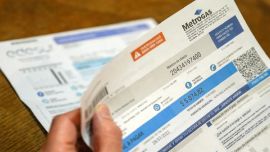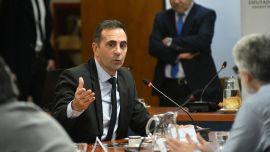The fight against the pandemic that last year saw heavyweight political rivals working together has now degenerated into a bitter legal battle between them over whether schools should stay shut for 15 days in the Buenos Aires metropolitan area (AMBA).
Buenos Aires City Mayor Horacio Rodríguez Larreta, a centre-right opposition leader, has taken the national government all the way to the Supreme Court after President Alberto Fernández announced his decision. A ruling was pending at press time, but like all legal battles involving rival politicians, this is not a straightforward fight. A group of “organised parents” took the case to a Buenos Aires City court first that ruled in their favour, effectively allowing schools to open normally in the capital. But that City court ruling was contested by a federal judge who said Rodríguez Larreta must abide by the national government’s decision and wait for the Supreme Court ruling.
Rodríguez Larreta, a potential presidential candidate in 2023, has ignored the federal court’s decision and schools are still open. The nation’s capital is part of a metropolitan area that also includes Greater Buenos Aires. The political difficulty is that working-class Greater Buenos Aires, a Kirchnerite bastion, lies in Buenos Aires Province and it has heeded the president's decision for children to revert to remote classes for 15 days. Speculation is rife that Fernández was prodded into closing the schools by Buenos Aires Province Governor Axel Kicillof and teachers’ unions.
Kicillof, a key ally of Vice-President Cristina Fernández de Kirchner, called a press conference on Wednesday and looked under real pressure as the number of Covid-19 cases continues to surge. There is increasing evidence that the health system is on the verge of collapse. Over 60.000 people have now died and more than 25,000 infections are being reported daily.
The governor on Wednesday has tried to avoid any direct confrontation with Rodríguez Larreta, though he has criticised him. The mayor last year preached moderation and worked with Fernández and Kicillof to agree on policies to tackle the pandemic. But now the opposition leader has effectively stared down the president, who last year called him a “friend,” and is defying a federal court order.
Midterm elections are scheduled for later this year and there is now no way of telling what effect the bickering about schools, which has many parents fuming, will have on the result. Kicillof, who was immensely popular before the pandemic, is now in uncharted territory and looking anxious in public. Buenos Aires Province is regulating the health system to monitor the number of cases in private and state hospitals. Private healthcare executives flanking Kicillof at the press conference have warned the situation is extremely serious and that there is no room for petty political arguments. “We are mucking about on the deck of the Titanic,” one said this week. These executives are implying that to flatten the curve something close to a lockdown will eventually be needed over winter – and that includes schools.
Fernández announced his decision on schools suddenly apparently overruling Education Minister Nicolás Trotta, a member of his inner circle, who only hours before was going about business as usual. Rumours about Trotta’s resignation swirled this week, but on Wednesday the minister resurfaced in a meeting with the president. The Fernández administration is now said to be considering a nationwide plan to regulate classes in schools according to the Covid situation, under the clunky name of “administered attendance.”
Rodríguez Larreta appears to have won the day but critics say his administration is in contempt of a federal court. The confrontation is not over. The City mayor is gambling with his future – the conflict could get him on the wrong side of the centre-left voters he will need to woo in order for a presidential bid to make sense. The mayor – much to the dismay of the confrontational wing in the opposition coalition headed by former president Mauricio Macri – has continually portrayed himself as a moderate willing to reach out to rivals in a bid to heal Argentina’s deep political rift.
The problem for Kicillof, in turn, is that the school feud could make for a wide open electoral race in Greater Buenos Aires. The governor, enthusiastically endorsed by Fernández de Kirchner, his former boss, won the gubernatorial election against incumbent centre-right governor María Eugenia Vidal in a memorable landslide win late in 2019. But will the pandemic change the progressive governor’s standing? The future of the Peronist administration now hinges on an electoral result in volatile Greater Buenos Aires, in the middle of an unpredictable pandemic.
The vote, however, has now been delayed. Amid the second wave surge, the opposition agreed on Thursday to support the government’s call to push back the PASO primaries and the midterm elections, originally slated to take place in August and October, for a month.
Nevertheless, it seems that education, as well as the handling of the pandemic, will continue to play on voters’ minds. Schools were closed last year at length, but the Juntos por el Cambio coalition, of which Rodríguez Larreta is a member, campaigned fervently for schools to reopen back in February. The opposition has something to work with, if Fernández’s snap decision to close schools for 15 days in AMBA region continues to dominate the political conversation. Suddenly school mums chatting in WhatsApp groups are a political force to be reckoned with. Fernández’s national broadcast announcing new restrictions prompted pot-banging protests in Buenos Aires City and some street demonstrations.
The ruling coalition, Kicillof especially, must now work to control any political damage in Greater Buenos Aires. The economic situation isn't helping either – inflation clocked in at 4.8 percent in March. Food inflation is rampant despite government price-control plans that monitor and limit price rises.
In Argentina the pandemic has not killed the political rift. Fernández was criticised by the opposition after his Twitter account, which he purportedly manages personally, retweeted a cartoon showing him vaccinating a gorilla on its backside, with Russian President Vladimir Putin looking on. (In local political jargon “a gorilla” is an anti-Peronist.) The retweet was later deleted, but not before many pundits threw a fit.
Still,the national government’s strategy is clear. It is trying to flatten the curve while it continues with the vaccination drive, which depends on jabs gradually arriving from abroad (mainly the Russian-made Sputnik V vaccine). An Argentine laboratory has announced that it is in the early stages of an ambitious plan to make a local version of the Russian vaccine. It's good news, but it hasn’t happened just yet. Viruses are not defeated by wishful thinking.





















Comments